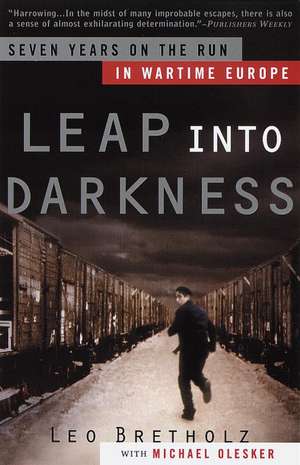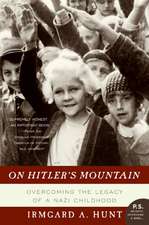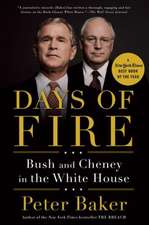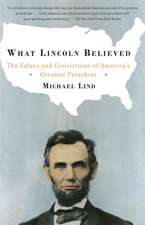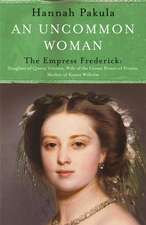Leap Into Darkness: Seven Years on the Run in Wartime Europe
Autor Leo Bretholz Michael Oleskeren Limba Engleză Paperback – 31 aug 1999
Young Leo Bretholz survived the Holocaust by escaping from the Nazis (and others) not once, but seven times during his almost seven-year ordeal crisscrossing war-torn Europe. He leaped from trains, outran police, and hid in attics, cellars, anywhere that offered a few more seconds of safety. First he swam the River Sauer at the German-Belgian border. Later he climbed the Alps on feet so battered they froze to his socks--only to be turned back at the Swiss border. He crawled out from under the barbed wire of a French holding camp, and hid in a village in the Pyrenees while gendarmes searched it. And in the dark hours of one November morning, he escaped from a train bound for Auschwitz.
Leap into Darkness is the sweeping memoir of one Jewish boy's survival, and of the family and the world he left behind.
Preț: 96.71 lei
Nou
Puncte Express: 145
Preț estimativ în valută:
18.50€ • 19.32$ • 15.28£
18.50€ • 19.32$ • 15.28£
Carte disponibilă
Livrare economică 25 martie-08 aprilie
Preluare comenzi: 021 569.72.76
Specificații
ISBN-13: 9780385497053
ISBN-10: 0385497059
Pagini: 288
Dimensiuni: 132 x 203 x 18 mm
Greutate: 0.25 kg
Ediția:Anchor Books.
Editura: Anchor Books
ISBN-10: 0385497059
Pagini: 288
Dimensiuni: 132 x 203 x 18 mm
Greutate: 0.25 kg
Ediția:Anchor Books.
Editura: Anchor Books
Notă biografică
Leo Bretholz arrived in the United States in 1947 and settled in Baltimore, where he worked in the textile business and then as a bookseller for many years. He continues to lecture extensively about his Holocaust memories. Michael Olesker is a columnist for the Baltimore Sun and a commentator on Baltimore's CBS affiliate, WJZ-TV.
Extras
March--October 1938
I saw Adolf Hitler with my own eyes from a distance of perhaps twenty yards. I could have leaped on him and hit him with all my strength, or stabbed him with a kitchen knife if I had one, or strangled the life out of him, except we were separated by rows of cheering, rapturous people who would have torn my heart out before I could get near him.
It was March 16, 1938. Four days earlier, the German army entered Austria, and Austria ceased to exist. The world cringed for a moment, and then went about its own business, which it still imagined was separate from ours.
I took the streetcar that day to the apartment building where Uncle Isidore and Aunt Charlotte lived with my cousins Anne and Judith in their last hours of innocence, before Hitler, and before a place called Auschwitz where all of them but Anne would go to die.
The sidewalks outside their building were covered with celebrants dressed in suits and waving Nazi flags. The atmosphere felt like some grand civic carnival, with intimidating expressions of superiority. My uncle and aunt lived by the Mariahilferstrasse, the major business artery over which Hitler's motorcade would travel that day. But no one in my family was watching this, even from a distance.
When I reached their apartment, they were nervously huddled in a back room with neighbors. The sight shook me. Their neighbors' apartment directly overlooked the Mariahilferstrasse, but they'd been removed from it in order for Vienna to welcome Hitler more jubilantly. All Jews had been ordered away from windows overlooking the motorcade, and sympathetic gentiles of Vienna were thrust into the homes of these Jews. The gentiles stood at the windows waving Nazi flags that had been handed to them. The Jews like my uncle's neighbors were shoved into the apartments of other Jews, with their fear and outrage running hand in hand.
Uncle Isidore was trying to assure everyone that all would be well. My ebullient Aunt Charlotte was silent and stunned. My cousins, looking to their parents for reassurance, seemed confused at so much sudden commotion.
"Leo!" my uncle cried.
Uncle Isidore was a man who carefully choreographed his every move, who took two hours each day to dress himself impeccably. But now he was reaching for shreds of his customary calm, because the sanctity of his home had been violated and he had lost his sense of authority.
It was this way all along the Mariahilferstrasse, an endless river of swastikas and posters and banners flapping in the afternoon air. It was as if newsreels seen in cinemas over the past months had suddenly been transplanted to Vienna and painted vivid colors.
We had watched evening fade into darkness five days earlier with the Austrian red-white-red flags flying, and awoke on March 12 with all of them gone. I went to a Jewish youth group meeting that Friday evening, the 11th, where we talked about emigrating to Palestine. Modern Hebrew, my father had declared in his dying hours. We danced the horah and sang Hebrew songs. At about nine o'clock, I walked home with my friends Arnold Jussem and Robert Hochmann. They were strong, confident fellows. Arnold was a track and field man; Robert was an amateur boxer. But there was something intimidating in the night air, too many police moving quickly about, and I was rattled by my strong friends' worried looks. When I reached home, my mother was standing by the front door with a stricken look on her face.
"Where were you?" she asked.
"With my friends."
"Don't you know what is going on?" she asked. She'd been listening to the end of our world coming over the radio. "Come," she said, dragging me into the house. "Come."
The red-white-red Austrian flags were all gone the next morning. They were replaced by swastikas hanging aloft, and the German army goose-stepping through the streets. We were suitably intimidated; they seemed almost automated in their precision. Now, with the arrival of the Anschluss, Austrian police and soldiers took off their uniforms and put on German uniforms. Austria's army instantly disappeared; Germany's instantly swelled. Austrian Brownshirts, who had assassinated Dollfuss in 1934 and who had operated surreptitiously under Chancellor von Schuschnigg, now triumphantly strutted about with confident sneers on their faces and swastika armbands on their jackets.
"It will be all right," my mother said in the safety of our apartment.
"Yes," I said, wishing to give her the comfort she was trying to give me, and failing as she failed.
Von Schuschnigg had been broken a month earlier, in a humiliating meeting at Berchtesgaden at which Hitler had raged and fumed, telling von Schuschnigg that he would do as he pleased, and take his army where he pleased, and that von Schuschnigg was powerless to stop him. Safely back in Vienna, the Chancellor took to the radio airwaves as people gathered in homes all over Austria to listen to him.
"Austrians," he declared, "the time for decision has come."
He called for a March 13 plebiscite to decide whether Austria wanted to remain independent or become a part of Germany. An honest vote never occurred. By the time German troops began pouring across the border, von Schuschnigg was on the radio again, urging citizens not to resist the inevitable, that blood should not be spilled in a cause that was already lost.
"May God protect Austria," he declared in a heavy voice. But it was too late for such words to have meaning; besides, many Austrians had already ceased listening.
On March 12, when German troops began arriving, Nazis all over Austria were mobilized. They crammed into the halls of the Chancellery and took over offices in Vienna. Von Schuschnigg, understanding the tides of history, yielded power without a fight. That night, Heinrich Himmler arrived in Vienna to secure control of the secret police. Other SS officers were flown in, and arrests followed that totaled many thousands in Vienna alone. Among the first was von Schuschnigg, who was sent to Dachau.
"So I'll go outside," I said rather flippantly to my uncle and aunt on the day of the grand motorcade. "I want to see this Hitler."
"It's not safe out there," my aunt said.
But I went outside. I was seventeen, what did I know? I saw some shops with letters hand-painted across their doors: Jude, verrecke! Jew croak! But this was nothing new. "Christ killers," they called us in the religion classes of the public schools. After that, what were words scrawled on a door?
I stood in front of Beck's Shoes, in a crowd six or seven deep stretching as far as I could see. Church bells tolled. Voices boomed out orchestrated choruses of "Sieg heil!" The cries came from chests newly swollen with bravado. Tears of joy slipped down the scrubbed, beefy faces of loyal Germans of Vienna.
I sensed such longing for authority and power in the crowd, which would translate into acts of sadism within hours. But, standing on the sidewalk beneath my uncle's apartment, I felt more curiosity than fear. There were too many people here, too many of my own countrymen, to turn on one little Jew.
We still assumed that Hitler wouldn't last. He would go away if we simply minded our own business. We felt we knew him. We saw him as a type of lunatic bully, but also as one of Austria's own, an upstart born here, who had later nurtured his hatred here. But surely, he would be swallowed up in some act of modern civility that we imagined Europe still possessed.
As Hitler's motorcade approached, I had no sense of witnessing history. But I was surely watching splendid theater: the tolling church bells, the sporadic sound of martial music reverberating just below them, flowers tossing about. And then, as the crowd's roars reached a crescendo, Hitler appeared.
He stood in the back of an open Mercedes. He wore a brown uniform and lifted his right arm from the elbow until it reached the side of his cheek. Trumpets blared. The crowd roared and roared. Drums pounded. So much excitement for one man, so much belief in one idea, which was the eradication of people like me. But why? I had just turned seventeen. In my naivet?, I wondered: Had the Jews done something truly terrible, something that had been kept from me?
Hitler's car, traveling at perhaps fifteen miles per hour, headed toward the Hofburg, the erstwhile imperial residence in Vienna. I couldn't see the sky for all of the banners waving above my head. The crowd thrust its arms into the air and roared again, "Heil Hitler!" in precisely the manner they'd seen crowds behave in the movie theater newsreels. "Ein Volk, ein Reich, ein Führer!" they shouted en masse.
"First Victims" they will call themselves when the world loses its memory.
I saw Adolf Hitler with my own eyes from a distance of perhaps twenty yards. I could have leaped on him and hit him with all my strength, or stabbed him with a kitchen knife if I had one, or strangled the life out of him, except we were separated by rows of cheering, rapturous people who would have torn my heart out before I could get near him.
It was March 16, 1938. Four days earlier, the German army entered Austria, and Austria ceased to exist. The world cringed for a moment, and then went about its own business, which it still imagined was separate from ours.
I took the streetcar that day to the apartment building where Uncle Isidore and Aunt Charlotte lived with my cousins Anne and Judith in their last hours of innocence, before Hitler, and before a place called Auschwitz where all of them but Anne would go to die.
The sidewalks outside their building were covered with celebrants dressed in suits and waving Nazi flags. The atmosphere felt like some grand civic carnival, with intimidating expressions of superiority. My uncle and aunt lived by the Mariahilferstrasse, the major business artery over which Hitler's motorcade would travel that day. But no one in my family was watching this, even from a distance.
When I reached their apartment, they were nervously huddled in a back room with neighbors. The sight shook me. Their neighbors' apartment directly overlooked the Mariahilferstrasse, but they'd been removed from it in order for Vienna to welcome Hitler more jubilantly. All Jews had been ordered away from windows overlooking the motorcade, and sympathetic gentiles of Vienna were thrust into the homes of these Jews. The gentiles stood at the windows waving Nazi flags that had been handed to them. The Jews like my uncle's neighbors were shoved into the apartments of other Jews, with their fear and outrage running hand in hand.
Uncle Isidore was trying to assure everyone that all would be well. My ebullient Aunt Charlotte was silent and stunned. My cousins, looking to their parents for reassurance, seemed confused at so much sudden commotion.
"Leo!" my uncle cried.
Uncle Isidore was a man who carefully choreographed his every move, who took two hours each day to dress himself impeccably. But now he was reaching for shreds of his customary calm, because the sanctity of his home had been violated and he had lost his sense of authority.
It was this way all along the Mariahilferstrasse, an endless river of swastikas and posters and banners flapping in the afternoon air. It was as if newsreels seen in cinemas over the past months had suddenly been transplanted to Vienna and painted vivid colors.
We had watched evening fade into darkness five days earlier with the Austrian red-white-red flags flying, and awoke on March 12 with all of them gone. I went to a Jewish youth group meeting that Friday evening, the 11th, where we talked about emigrating to Palestine. Modern Hebrew, my father had declared in his dying hours. We danced the horah and sang Hebrew songs. At about nine o'clock, I walked home with my friends Arnold Jussem and Robert Hochmann. They were strong, confident fellows. Arnold was a track and field man; Robert was an amateur boxer. But there was something intimidating in the night air, too many police moving quickly about, and I was rattled by my strong friends' worried looks. When I reached home, my mother was standing by the front door with a stricken look on her face.
"Where were you?" she asked.
"With my friends."
"Don't you know what is going on?" she asked. She'd been listening to the end of our world coming over the radio. "Come," she said, dragging me into the house. "Come."
The red-white-red Austrian flags were all gone the next morning. They were replaced by swastikas hanging aloft, and the German army goose-stepping through the streets. We were suitably intimidated; they seemed almost automated in their precision. Now, with the arrival of the Anschluss, Austrian police and soldiers took off their uniforms and put on German uniforms. Austria's army instantly disappeared; Germany's instantly swelled. Austrian Brownshirts, who had assassinated Dollfuss in 1934 and who had operated surreptitiously under Chancellor von Schuschnigg, now triumphantly strutted about with confident sneers on their faces and swastika armbands on their jackets.
"It will be all right," my mother said in the safety of our apartment.
"Yes," I said, wishing to give her the comfort she was trying to give me, and failing as she failed.
Von Schuschnigg had been broken a month earlier, in a humiliating meeting at Berchtesgaden at which Hitler had raged and fumed, telling von Schuschnigg that he would do as he pleased, and take his army where he pleased, and that von Schuschnigg was powerless to stop him. Safely back in Vienna, the Chancellor took to the radio airwaves as people gathered in homes all over Austria to listen to him.
"Austrians," he declared, "the time for decision has come."
He called for a March 13 plebiscite to decide whether Austria wanted to remain independent or become a part of Germany. An honest vote never occurred. By the time German troops began pouring across the border, von Schuschnigg was on the radio again, urging citizens not to resist the inevitable, that blood should not be spilled in a cause that was already lost.
"May God protect Austria," he declared in a heavy voice. But it was too late for such words to have meaning; besides, many Austrians had already ceased listening.
On March 12, when German troops began arriving, Nazis all over Austria were mobilized. They crammed into the halls of the Chancellery and took over offices in Vienna. Von Schuschnigg, understanding the tides of history, yielded power without a fight. That night, Heinrich Himmler arrived in Vienna to secure control of the secret police. Other SS officers were flown in, and arrests followed that totaled many thousands in Vienna alone. Among the first was von Schuschnigg, who was sent to Dachau.
"So I'll go outside," I said rather flippantly to my uncle and aunt on the day of the grand motorcade. "I want to see this Hitler."
"It's not safe out there," my aunt said.
But I went outside. I was seventeen, what did I know? I saw some shops with letters hand-painted across their doors: Jude, verrecke! Jew croak! But this was nothing new. "Christ killers," they called us in the religion classes of the public schools. After that, what were words scrawled on a door?
I stood in front of Beck's Shoes, in a crowd six or seven deep stretching as far as I could see. Church bells tolled. Voices boomed out orchestrated choruses of "Sieg heil!" The cries came from chests newly swollen with bravado. Tears of joy slipped down the scrubbed, beefy faces of loyal Germans of Vienna.
I sensed such longing for authority and power in the crowd, which would translate into acts of sadism within hours. But, standing on the sidewalk beneath my uncle's apartment, I felt more curiosity than fear. There were too many people here, too many of my own countrymen, to turn on one little Jew.
We still assumed that Hitler wouldn't last. He would go away if we simply minded our own business. We felt we knew him. We saw him as a type of lunatic bully, but also as one of Austria's own, an upstart born here, who had later nurtured his hatred here. But surely, he would be swallowed up in some act of modern civility that we imagined Europe still possessed.
As Hitler's motorcade approached, I had no sense of witnessing history. But I was surely watching splendid theater: the tolling church bells, the sporadic sound of martial music reverberating just below them, flowers tossing about. And then, as the crowd's roars reached a crescendo, Hitler appeared.
He stood in the back of an open Mercedes. He wore a brown uniform and lifted his right arm from the elbow until it reached the side of his cheek. Trumpets blared. The crowd roared and roared. Drums pounded. So much excitement for one man, so much belief in one idea, which was the eradication of people like me. But why? I had just turned seventeen. In my naivet?, I wondered: Had the Jews done something truly terrible, something that had been kept from me?
Hitler's car, traveling at perhaps fifteen miles per hour, headed toward the Hofburg, the erstwhile imperial residence in Vienna. I couldn't see the sky for all of the banners waving above my head. The crowd thrust its arms into the air and roared again, "Heil Hitler!" in precisely the manner they'd seen crowds behave in the movie theater newsreels. "Ein Volk, ein Reich, ein Führer!" they shouted en masse.
"First Victims" they will call themselves when the world loses its memory.
Recenzii
"Harrowing...In the midst of many improbable escapes, there is also a sense of almost exhilarating determination." --Publishers Weekly
"Riveting--a fascinating and moving piece of history." --Library Journal
"No one can read [this] history without realizing--the remarkable courage of individuals, and the tremendous importance of stories such as this being published for all to read." --Sir Marin Gilbert, author of The Holocaust
"This loving and lovely memoir should be read by everyone interested in the daily lives of young Jews caught in the Holocaust. Leo Bretholz's story grabs you, and it won't shake when you've finished the book." --Deborah Dwork, coauthor of Auschwitz: 1270 to Present
"This memoir is that rarest of all survivors: a man who jumped from a train on his way to a death camp. The reader is with Bretholz at every step, following with mounting tension his struggle to escape." --Raul Hilberg, author of The Destruction of the European Jews
"Riveting--a fascinating and moving piece of history." --Library Journal
"No one can read [this] history without realizing--the remarkable courage of individuals, and the tremendous importance of stories such as this being published for all to read." --Sir Marin Gilbert, author of The Holocaust
"This loving and lovely memoir should be read by everyone interested in the daily lives of young Jews caught in the Holocaust. Leo Bretholz's story grabs you, and it won't shake when you've finished the book." --Deborah Dwork, coauthor of Auschwitz: 1270 to Present
"This memoir is that rarest of all survivors: a man who jumped from a train on his way to a death camp. The reader is with Bretholz at every step, following with mounting tension his struggle to escape." --Raul Hilberg, author of The Destruction of the European Jews
Descriere
A harrowing, action-packed account of the author's series of audacious escapes from the Nazis' final solution--"riveting . . . a fascinating and moving piece of history" ("Library Journal").
